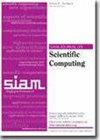带人工边界条件的量子动力学量子模拟
IF 2.6
2区 数学
Q1 MATHEMATICS, APPLIED
引用次数: 0
摘要
SIAM 科学计算期刊》,第 46 卷第 4 期,第 B403-B421 页,2024 年 8 月。 摘要量子动力学通常以具有赫米特哈密顿的时变薛定谔方程的形式表示,是量子计算的自然应用。然而,在模拟涉及电子发射的量子动力学时,有必要使用人工边界条件(ABC)将计算限制在一个固定的域内。ABC 的引入改变了动力学的哈密顿结构,现有的量子算法无法直接应用,因为演化不再是单一的。本文利用最近引入的薛定谔化方法,将非赫米态动力学转换为薛定谔形式,用于人工边界问题 [S. Jin, N. Liu, and Y. J., J., J., J., J., J., J., J., J., J., J., J., J., J., J., J., J., J.S. Jin, N. Liu, and Y. Yu, Quantum Simulation of Partial Differential Equations via Schrödingerisation, preprint, arXiv:2212.13969, 2022],[S. Jin, N. Liu, and Y. Yu, Phys. Rev. A, 108 (2023), 032603]。我们针对三种 ABC 实现了这种方法,包括复杂吸收势技术、完全匹配层方法和 Dirichlet 到 Neumann 方法。我们分析了这些算法的查询复杂度,并通过数值实验证明了这种方法的有效性。这有助于缩小现有量子算法与无界域量子动力学计算模型之间的差距。本文章由计算机程序翻译,如有差异,请以英文原文为准。
Quantum Simulation for Quantum Dynamics with Artificial Boundary Conditions
SIAM Journal on Scientific Computing, Volume 46, Issue 4, Page B403-B421, August 2024.
Abstract. Quantum dynamics, typically expressed in the form of a time-dependent Schrödinger equation with a Hermitian Hamiltonian, is a natural application for quantum computing. However, when simulating quantum dynamics that involves the emission of electrons, it is necessary to use artificial boundary conditions (ABCs) to confine the computation within a fixed domain. The introduction of ABCs alters the Hamiltonian structure of the dynamics, and existing quantum algorithms cannot be directly applied since the evolution is no longer unitary. The current paper utilizes a recently introduced Schrödingerization method that converts non-Hermitian dynamics into a Schrödinger form for the artificial boundary problems [S. Jin, N. Liu, and Y. Yu, Quantum Simulation of Partial Differential Equations via Schrödingerisation, preprint, arXiv:2212.13969, 2022], [S. Jin, N. Liu, and Y. Yu, Phys. Rev. A, 108 (2023), 032603]. We implement this method for three types of ABCs, including the complex absorbing potential technique, perfectly matched layer methods, and Dirichlet-to-Neumann approach. We analyze the query complexity of these algorithms and perform numerical experiments to demonstrate the validity of this approach. This helps to bridge the gap between available quantum algorithms and computational models for quantum dynamics in unbounded domains.
Abstract. Quantum dynamics, typically expressed in the form of a time-dependent Schrödinger equation with a Hermitian Hamiltonian, is a natural application for quantum computing. However, when simulating quantum dynamics that involves the emission of electrons, it is necessary to use artificial boundary conditions (ABCs) to confine the computation within a fixed domain. The introduction of ABCs alters the Hamiltonian structure of the dynamics, and existing quantum algorithms cannot be directly applied since the evolution is no longer unitary. The current paper utilizes a recently introduced Schrödingerization method that converts non-Hermitian dynamics into a Schrödinger form for the artificial boundary problems [S. Jin, N. Liu, and Y. Yu, Quantum Simulation of Partial Differential Equations via Schrödingerisation, preprint, arXiv:2212.13969, 2022], [S. Jin, N. Liu, and Y. Yu, Phys. Rev. A, 108 (2023), 032603]. We implement this method for three types of ABCs, including the complex absorbing potential technique, perfectly matched layer methods, and Dirichlet-to-Neumann approach. We analyze the query complexity of these algorithms and perform numerical experiments to demonstrate the validity of this approach. This helps to bridge the gap between available quantum algorithms and computational models for quantum dynamics in unbounded domains.
求助全文
通过发布文献求助,成功后即可免费获取论文全文。
去求助
来源期刊
CiteScore
5.50
自引率
3.20%
发文量
209
审稿时长
1 months
期刊介绍:
The purpose of SIAM Journal on Scientific Computing (SISC) is to advance computational methods for solving scientific and engineering problems.
SISC papers are classified into three categories:
1. Methods and Algorithms for Scientific Computing: Papers in this category may include theoretical analysis, provided that the relevance to applications in science and engineering is demonstrated. They should contain meaningful computational results and theoretical results or strong heuristics supporting the performance of new algorithms.
2. Computational Methods in Science and Engineering: Papers in this section will typically describe novel methodologies for solving a specific problem in computational science or engineering. They should contain enough information about the application to orient other computational scientists but should omit details of interest mainly to the applications specialist.
3. Software and High-Performance Computing: Papers in this category should concern the novel design and development of computational methods and high-quality software, parallel algorithms, high-performance computing issues, new architectures, data analysis, or visualization. The primary focus should be on computational methods that have potentially large impact for an important class of scientific or engineering problems.

 求助内容:
求助内容: 应助结果提醒方式:
应助结果提醒方式:


